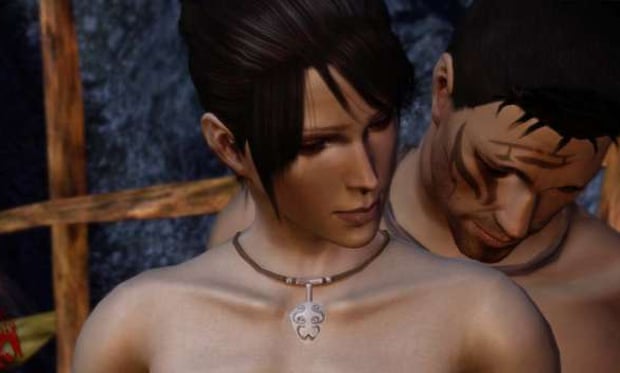Cinema, too, has explored it for many years – all those two-hour stories of forgiveness and redemption, and Julia Roberts just being a girl standing in front of a boy, asking him to love her. Books have been there for centuries, covering both ends of the sexy spectrum from the gently smouldering affection between Elizabeth and Darcy, to Morrissey’s car crash of a sex scene.
In my experience, limited though it is, love is lots of things: it is a reason to smile, it is a punch in the stomach. I’ve loved and lost, which is not any better than having never loved at all, but it sure sounds poetic, doesn’t it?
The best I can manage is this: love is a complicated cocktail of chemistry and social constructs.
Video games, a relatively new medium, are still struggling to get the ingredients right. They have, by their very nature, tended to gamify love and this has led to a goal-centric understanding. What, exactly, could function as a win state in the game of love? Sex. Obviously.
In the popular dating sim genre, a staple of Japanese gaming culture since the 1980s, you give gifts and attention and churn away at raising statistics like “Charm” and “Charisma” until you get the girl of your virtual dreams. Dating is literally the game, and sex is literally your goal; to emphasise this point, many dating games fade to black immediately post-coitus. If that’s happening to you in real life, it’s probably something you ought get check out. There’s an element of fun in chasing that goal - it is still a game, after all – but buying a gal shoes every day until she’s willing to do the horizontal shuffle with you ... well, it ain’t love.
“What, you think we’re close enough? Oh, not nearly. If you like what we’ve got now, I think you’ll love what I’ve got in store ... I want us to turn our spark into some real fire. So be ready, OK?”
This is then, the absolute commodification of love, and once again, the ultimate aim is boning. In Harvest Moon, kissing doesn’t even happen until you get married, and then the only evidence that you even sleep with your husband is when you have kids – and even that’s sometimes implied to be actual magic. This is not a progressive message about the complexity of love.
More nuanced portrayals of relationships can be found in the epic role-playing adventures created by Edmonton-based studio Bioware. Mass Effect and Dragon Age are both known for their emotional fluidity; their dialogue manages to be touching and sentimental without becoming treacly and excessive. There is always at least one scene where your paramour confesses their undying love to you … though admittedly, this usually ends in fucking.
In Dragon Age Inquisition, there is one scene, with a character named Iron Bull, that is intensely sexual, with S&M, safe words and pillow talk all bundled in. It’s still goal-orientated but at least it’s a much deeper experience than most other games manage – there’s foreplay and human (well, in my case, dwarf/Qunari) interaction before, during and after the act. It’s real, it’s relatable, it’s actually pretty damn sexy. But is it all about getting to that end goal once again? Is it all about penetration?
I’m not saying sex is something that should be taken out completely – God, no – but it would be wonderful, once in a while, to see it worked into a fuller narrative, a more intricate human experience.

It’s unlikely that video game relationships are ever going to feel exactly right. They are missing too much of the tangible feedback we require to complete the emotional cycle, to feed our hunger. There’s a tale from Plato’s Symposium on the origin of love. In the beginning, the story goes, humans were spherical. Two heads, eight limbs, two hearts. Like octopuses. Sort of. Through their own hubris, they fought the gods and were doomed to be cut in two, like oranges – straight through the middle, their skin pulled tight into the centre to cover the wound, resulting in a neat little knot in the centre of the stomach.
The two halves yearned to be a whole again - to join together as they had been before. That’s love, says Plato. That’s why we need to be touched, and to touch, and to slot ourselves into the neat little bits where we fit together.
Games don’t treat love like this - they don’t try to understand it, they just try to replicate its processes, and to varying levels of success. Sometimes, it’s a simple mechanic - press X to kiss, move forward to hug, rotate analogue stick to gently tweak a nipple. Other times, it’s more of a narrative device, as with Gone Home’s unfolding relationship. But in the end, the problem lies with us – the protagonist and player.
Films and books can tell convincing love stories because they’re not about us. They can create two characters, and make them love each other. It’s worth mentioning that Gone Home and To The Moon, games about someone else’s love story, work well for this reason - because their story is separate to our experience, so it comes to us entirely whole, without the need for our input.
But I keep coming back to Cibele and Dragon Age Inquisition’s Iron Bull. Both portray a single snapshot of a romance – in Cibele’s case, it’s a yearning driven by youthful naivety, that first heartbreak that’s more painful than the rest because it’s a virgin heart. We’ve all been there. Iron Bull, on the other hand, is an experience we haven’t necessarily all had: the kinky, intense, lustful encounter that’s also tender. These examples might not cover all the day-to-day stuff in a relationship, but the bits they do cover, they get right.
Games can’t hope to replicate every single facet of human relationships – they’re limited by technology, time, budget. It’s hard to create something organic in such a resolutely inorganic medium. Though they appear goal-orientated, Cibele and Dragon Age Inquisition give the player an experience that’s whole – they have a beginning, a middle and an end, and they hint at a future of romantic games in which sex is only part of the equation.

No comments:
Post a Comment
comment